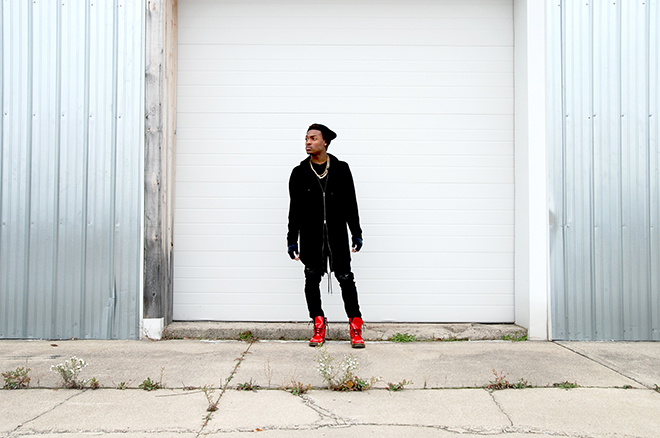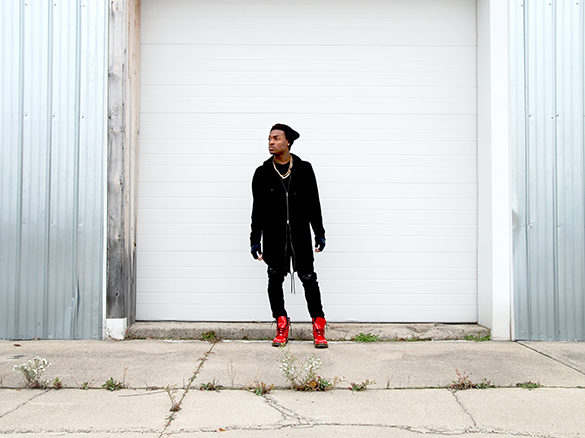At first glance, Rodney’s daily ritual in middle school didn’t seem far from normal. He awoke to the blare of his alarm clock, slipped on his uniform for the day and waited outside for the school bus.
It wasn’t hard to spot which bus was his. A sea of navies and charcoals would soon approach his house. He hopped on and blended in with the crowd en route to Prince Chapman Academy.
Like many of his peers buckling under the pressure of acceptance, Rodney Walker Jr. walked into class wondering if his friends still liked him, if his classmates thought he was funny, or if his teachers were proud of him.
From the perspective of a young student, the feeling of acceptance is earned in those three imperative years. Students may be striving for A’s to impress their parents, but a moment rarely passes where they aren’t thinking about where they belong in.
“[Students] feel the need to fit in as a result of self-esteem issues,” Walker said. “We go through and experience so much in middle school. The best remedy to cover up all that we experience is acceptance.”
Unlike most students, Walker knew there was more meaning than belonging to a certain group. However, he couldn’t escape the feeling that he needed to look like everyone else.
“Familiarity provides a feeling of security,” said Amy Harden, an assistant professor of fashion at Ball State. “Dress is a fairly easy way to express or demonstrate belonging to a social group by adapting to the way they dress. Therefore dressing to ‘fit in’ provides the feeling of security.”
Schools like Prince Chapman Academy have strict uniform policies that make it impossible for students to differentiate themselves.
“We couldn’t show who we were,” Walker said. “Your wardrobe is a reflection of who you are. So when we are stuck wearing uniforms, nobody is different. It’s really stifling.”
Harden explains that the need to belong conflicts with one’s ability to expressing themselves.
“In some ways we want to be different from all the rest [by] dressing a bit differently,” Harden said. “However, we do want to belong because we fear being too different will mean we will be alone. Dress provides us with a unique way of expressing the balance that we feel between wanting to conform and wanting to express individuality.”
Harden explains that young adults reach a point where factors in their life help them become more liberated from meeting a societal standard. Instead, they begin to experiment with a lifestyle of self-expression.
“The more secure a person is with who they are or their life stage or their occupation, the more they may be willing to express individuality,” Harden said. “The internal question people ponder is what is the risk. If you behave in an individualistic manner, will you be punished or ostracized for not conforming to existing social standards?”
Despite the risk, Walker chose to use fashion to break from the uniformity he had been accustomed.
“It was so liberating. It felt good,” said Walker. “I was actually able to express myself and be different. I love to stand out and be who I am.”
Hardens explains that, opposed to teenagers, college students are no longer styling their wardrobe to fit a certain social status. Rather, they are dressing however they please.
“During adolescence, when we are trying to figure out who we are and are feeling uncertain, the need to belong is very strong,” said Harden. “Once we move beyond middle school and high school, we begin to feel less uncertain about who we are and the need to conform in order to belong. This often gets replaced with a desire to express yourself as an individual.”
Once freshman Walker entered Ball State’s campus, he ran with the attitude of not caring how others viewed him and didn’t look back. Walker is known for his eclectic wardrobe and finally feels free to express his true self.
“College is definitely a place where people have learned to explore and come out in their time,” Walker said. “They get a fresh start.”
Walker’s journey is similar to any individual’s undergoing change. As students progress and mature, they are liberated to show the world their raw selves.
“Life is too short to try to prove to people certain things,” said Walker. “Just live. Know that there is no limit. When it comes to fashion, be you. Be free. Be bold. Know that nothing is going to stop you. Nothing can stop you.”




